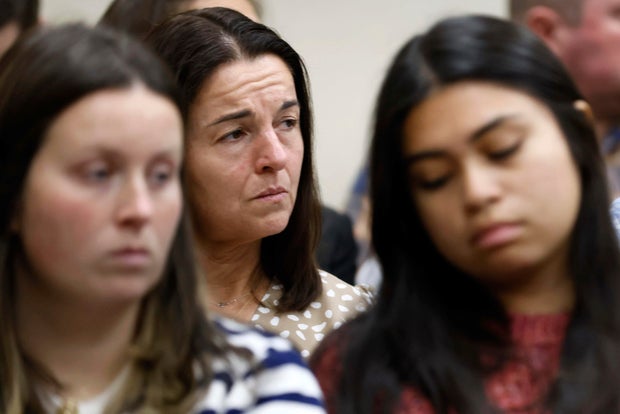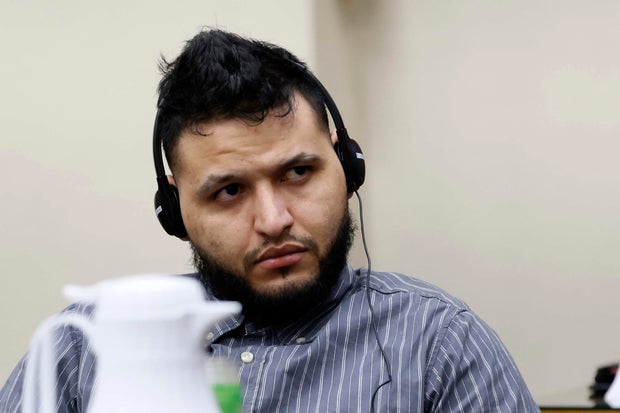CBS News
U.S. raises terror alert at military bases in Europe

Watch CBS News
Be the first to know
Get browser notifications for breaking news, live events, and exclusive reporting.
CBS News
Man convicted of murder in death of Laken Riley, Georgia nursing student killed on jogging trail

A judge has convicted the man on trial for the killing of Laken Riley, a nursing student in Georgia whose death in February shook the college town where she studied, as well as the country.
Jose Ibarra, 26, was found guilty of murder and other charges related to Riley’s death. Ibarra, an undocumented Venezuelan immigrant, entered the United States illegally in 2022, officials said, but he was allowed to remain in the country to pursue his immigration case. His status helped bring the national debate over border laws to a boiling point earlier this year, as prominent Republicans, including President-elect Donald Trump, blamed President Biden’s policies for Riley’s death.
ELIJAH NOUVELAGE/AFP via Getty Images
The decision by Athens-Clarke County Superior Court Judge H. Patrick Haggard ended a string of hearings that began last week. Ibarra waived his right to a jury trial after pleading not guilty to a 10-count indictment brought against him in the wake of Riley’s killing, which meant the case would be heard and decided solely by the judge. He also declined to testify during the trial.
The state had charged Ibarra with one count of malice murder, three counts of felony murder and one count each of kidnapping, aggravated assault, aggravated battery, hindering an emergency telephone call, tampering with evidence, and being a “peeping Tom.” That final charge stemmed from prosecutors’ allegation that Ibarra peered into the window of an apartment in a university residential building on the day Riley was murdered. Prosecutors said he was “hunting for females on the University of Georgia’s campus” when he encountered Riley.
Although prosecutors did not seek the death penalty in this case, they said in court documents that they intended to push for a sentence of life in prison without the possibility of parole.
Riley was found dead on Feb. 22 in a wooded part of the University of Georgia campus in Athens, where she was enrolled in the Augusta University College of Nursing. The 22-year-old had gone for a run that morning through the school’s intramural fields, which was routine for her, and a concerned friend called University of Georgia police at around noon once Riley failed to return. She often talked to her mother on the phone while out running in the mornings, so when Riley’s friends and family did not hear from her, they worried something was wrong.
Riley’s mother, Allyson Phillips, called and texted her daughter several times after missing an initial call from Riley just after 9 a.m., according to logs and messages pulled from the student’s phone and shown in court Tuesday, as the state’s case wound down. Phillips and other family members continued to reach out to Riley for several hours when she did not reply.
Phillips cried at the Tuesday hearing as her text messages were read aloud on the stand by Georgia Police Sgt. Sophie Raboud, one of the lead investigators in Riley’s case. In one of her final messages to Riley at 11:47 a.m., her mother wrote, “You’re making me nervous not answering while you’re out running. Are you OK?”
Riley’s mother, along with family and friends in attendance, became emotional at a different point in Raboud’s testimony where she answered questions about the video being played of Riley running the morning of her death.
Miguel Martinez-Jimenez / Atlanta Journal-Constitution via AP
Ibarra was arrested the following day and booked without bond in the Athens-Clarke County Jail. Police have said Riley’s killing appeared to be a random attack. But the indictment returned by a Georgia grand jury in May detailed a gruesome confrontation in which Ibarra allegedly asphyxiated the student, hit her over the head with a rock to the point of disfiguring her skull, and pulled up her clothing, intending to rape her.
In court, attorneys for the state also described a disturbing scene. Prosecutor Sheila Ross said Friday that Ibarra killed Riley violently after a prolonged struggle.
“When Laken Riley refused to be his rape victim, he bashed her skull in with a rock repeatedly,” Ross told the judge. She said evidence — including surveillance footage, traces of Ibarra’s DNA under Riley’s fingernails, and his thumbprint left behind on her phone screen — would show the student “fought for her life, for her dignity” over almost 20 minutes.
Data from Riley’s watch indicated she stopped suddenly in the middle of her run at around 9:10 a.m. the day she died and called 911 about a minute later. The watch showed Riley’s heart was still beating until 9:28 a.m., Ross said.
Ibarra’s defense attorney, Dustin Kirby, had argued the prosecution’s evidence against his client was circumstantial and did not prove his guilt. Ibarra has appeared in court with shackles around his ankles and headphones to follow a translation of the trial proceedings in Spanish.
Miguel Martinez/Atlanta Journal-Constitution via AP, Pool
“The evidence in this case is very good that Laken Riley was murdered,” Kirby said. Still, the defense has tried to challenge the strength of the prosecution’s evidence, saying even the DNA sample may not completely rule out other suspects. Ibarra’s legal team raised questions, for example, about whether one of his brothers could have committed the crime. The defendant’s brother Diego Ibarra worked a shift at the University of Georgia’s dining hall on the day of the murder.
Witness testimony for the prosecution continued into Monday, when an FBI Special Agent James Burnie told the court that electronic location data seemed to place Riley and Ibarra in the same wooded area at the time of her death. GPS coordinates from Riley’s cellphone and smartwatch confirmed her precise location in the area where officers found her body, and pings between Ibarra’s phone and cell towers suggested he was likely in the woods, too, Burnie said.
Prosecutors during that hearing also played a recording for the court of a May phone call between Ibarra’s wife, Layling Franco, and Ibarra while he was in jail. On the call, Ibarra told Franco he had been looking for work at the University of Georgia, and his wife urged him multiple times to tell her the truth about what happened to Riley, FBI specialist Abeisis Ramirez said during his testimony. The recording of their conversation was translated from Spanish for the court.
The jail call was not admitted into evidence in Ibarra’s trial and could not be considered in the case, Judge Haggard announced Tuesday morning.
“After hearing the translations I do find that it was more than contextual, and therefore violates the confrontation clause of the 6th Amendment,” the judge said. The clause protects the rights of an individual accused of a crime to confront witnesses.
contributed to this report.
CBS News
1 dead as bomb cyclone hits Pacific Northwest

Watch CBS News
Be the first to know
Get browser notifications for breaking news, live events, and exclusive reporting.
CBS News
Paul Simon’s search for hearing loss cure leads him to groundbreaking Stanford Medicine program and some hope

When legendary singer-songwriter Paul Simon began to lose his hearing nearly four years ago while working on his solo album, “Seven Psalms,” he feared he wouldn’t be able to perform again.
“It was incredibly frustrating. I was very angry at first that this had happened,” Simon told CBS News senior culture correspondent Anthony Mason in an interview for “CBS Mornings.”
He admits one of his biggest fears was giving up what he loves: making music.
“I guess what I’m most apprehensive about would be if I can’t hear well enough to really enjoy the act of making music,” Simon said.
Since then, he’s had dramatic hearing loss, sharing that he now has about 6% hearing in his left ear. But he’s learned to make adjustments. He’s switched to larger speakers, placing them all around him when he’s playing so he can hear better. He’s also had to change how and what he plays.
“I’m going through my repertoire and reducing a lot of the choices that I make to acoustic versions. It’s all much quieter. It’s not ‘You Can Call Me Al.’ That’s gone. I can’t do that one,” Simon said, chuckling.
Simon is still writing music and he returned to the stage in September for a rare, stripped-down performance at The Soho Sessions in New York.
“You know Matisse, when he was suffering at the end of his life, when he was in bed, he envisioned all these cut-outs and had a great creative period,” Simon said. “So I don’t think creativity stops with disability. So far, I haven’t experienced that. And I hope not to.”
Paul Simon’s search for answers
At first, doctors told Simon there was nothing they could do about his hearing loss. Then, he learned about the Stanford Medicine Initiative to Cure Hearing Loss, which includes a team of nearly 100 scientists searching for ways to prevent, repair and replace damaged inner ear tissue.
That’s promising news for Simon and millions like him. Hearing loss is on the rise, affecting nearly 1.5 billion people across the globe, according to Stanford Medicine.
Mason recently joined Simon during a visit to the program’s facility in Palo Alto, California, sitting in on Simon’s exam with Dr. Konstantina Stankovic.
“Hearing bones are the smallest bones in the body,” Dr. Stankovic said. “And then they are connected to the inner ear, which is called the cochlea. And it looks like a snail.”
The cochlea is so small and fragile it’s impossible to biopsy without causing deafness. It’s hidden in the hardest bone in the body, located deep in the skull, Dr. Stankovic explained.
What can animals teach us about hearing loss?
Certain animals can recover from hearing loss because their hair cells regenerate. It’s the hairs in the ear, called cilia, that transmit sound to the brain.
“We actually have the same genetic machinery, it’s just turned off in people,” Dr. Stankovic told Mason. “And the key question is how do you turn it on? And how do you turn it on safely, because cancer is regeneration gone awry.”
In a lab at the Stanford Medicine Initiative to Cure Hearing Loss, geneticist Teresa Nicolson is studying zebrafish, which have similar inner ear structures to humans.
Nicolson said they’ve made a recent, exciting discovery. They were able to rescue hearing in zebrafish with hearing loss mutations using an FDA-approved drug. The hope is it could one day be used in humans.
Down the hall, biophysicist Tony Ricci is conducting an experiment focused on mice.
“So the hair bundle is the site where most damage happens. So with aging, with noise…we are trying to understand how the bundle – like it’s a machine, right? So how this machine works normally,” Ricci said.
“So then when we know what piece’s parts are getting broken, we can figure out how do we fix it or how do we replace it,” he added.
Surgeon and scientist Dr. Alan Cheng is using gene therapy to coax the damaged hair cells in mice to regenerate. He’s also studying human cochlea samples from organ donors.
“We’re the only place in the world that can do it, in fact,” Dr. Cheng said.
The team was surprised to find that damaged human hair cells do begin to regenerate on their own, but only partially. Now they need to find out whether the drug cocktail they’ve used in mice could work in humans.
For Dr. Cheng, this research is personal.
“My mom, who has hearing loss, she’s been asking how can we regenerate cells for her,” he said.
“That’s what I’ve been asking ever since I met you guys,” Simon added with a smile.
Dr. Cheng said simply: “We’re working on it.”











